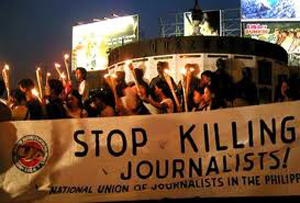
Philippine journalist union supporters protest over the killings of media workers. Photo: Arkibong Bayan
PMW ID
7421
OPINION: BANGKOK: Of all the attacks against media and its practitioners, none is more heinous than the slaying of journalists - and getting away with murder.
Nowhere is this anomaly more pronounced than in Asia-Pacific, where by South East Asian Press Alliance's (SEAPA) reckoning at least seven media workers were killed in several countries in 2010 just because they were performing their duties as members of media.
In the Philippines alone, four were killed in 2010. These were mostly radio broadcasters in the provinces who were silenced after they ran exposés of graft and corruption in local government offices.
Indeed, the Philippines has the dubious record of having the highest number of journalists killed in the line of duty in a single incident. We are referring to the Ampatuan massacre, in which 33 media workers were shot dead in politically-related circumstances.
The killings continue. This year, two were slain.
Elsewhere in the region, journalists were also targeted. One was killed in the line of duty in Indonesia in 2010. In Thailand, two foreign media workers were shot dead while they were covering the protest rallies last year. But beyond the killings, the greater concern is how governments have responded to these crimes.
In the Philippines, the Ampatuan massacre case drags on while several potential witnesses have been killed.
In Thailand, the suspects behind the deaths of Reuters cameraman Hiro Muramoto and freelance photojournalist Fabio Polenghi remain unknown.
In Indonesia, police have discontinued their investigation into the slaying of reporter Ridwan Salamun, even putting forward the ludicrous suggestion that he provoked the riots where he eventually met his death.
As can be deduced, many of the suspects were able to get away with murder. Either because the concerned government and its agencies are incompetent or deliberately turning a blind eye to the crimes or are vulnerable to the power and influence of the perpetrators and their protectors in high places. Impunity is a very serious offense against press freedom in the region.
As we in SEAPA observe World Press Freedom Day this year, we are outraged at the killings of our colleagues in the media and the slow pace of justice in the various countries in the region where these crimes take place.
We therefore would like to use this occasion to issue a strong call on the governments of these countries in Southeast Asia to ensure that journalists are given democratic space to practice their profession and be assured of their personal security and safety. We strongly urge the heads of these states to quicken the pace of investigation and prosecution of cases involving the killing of journalists.
Killing the messenger of bad tidings does not solve the problem of those in power. These heinous acts only further put a democratic society in danger. - Southeast Asian Press Alliance/Pacific Media Watch
For more information:
Southeast Asian Press Alliance
Unit 3B, Thakolsuk Place
No. 115 Terddumri Road
Dusit, Bangkok 10300
Thailand
seapa (@) seapa.org
Phone: +66 2 243 5579
Fax: +66 2 244 8749



